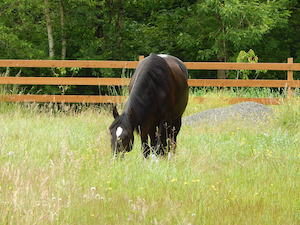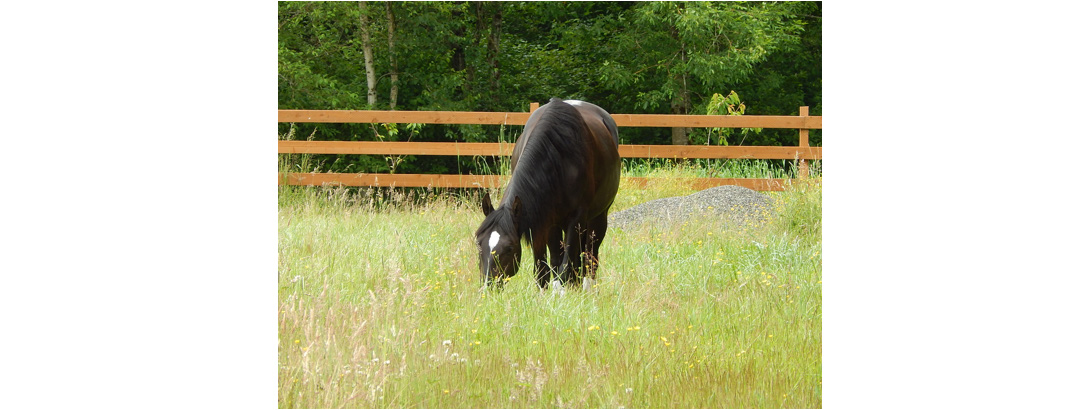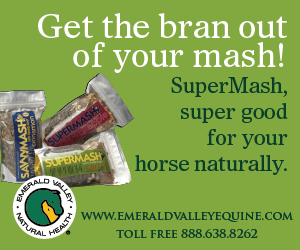10 Considerations to Reduce the Risk
by Dave Sauter, DVM

Colic is one of those words that triggers fear in the hearts of horse owners. Colic is a leading cause of death in horses. National estimates (NAHMS, USDA) indicate that about 4 out of 100 horses will colic in a year’s time. I suspect the number is higher. Fortunately, simple problems such as gas or cramps account for most cases. If treated early, before problems escalate, these colics respond very well to medical treatments. Some colics, however, are more serious and will require extensive medical treatment such as surgery.
To reduce the risk of colic, pay close attention to these ten things:
- Water
Daily water requirements can vary anywhere from 4 to 15 gallons or so a day for an average 1000-lb horse. Factors affecting daily water consumption include weather, breed, individual differences, the amount of dry feed in the diet, how much work they perform and lactation. It is important to provide clean, fresh water that is accessible 24/7.- Periodically scrub out water buckets, automatic waters and water troughs
- Make it easy for injured, arthritic or lame horses to get to water. In some cases, putting out additional water buckets can be helpful
- Tank heaters prevent water from freezing, but the water is still very cold. Studies have shown that by offering lukewarm water a couple times a day, horses will drink more.
- A sudden freeze of clumpy ground or frozen water puddles as is commonly found around the water trough can be painful, difficult or even dangerous to navigate. Again, make it easy to get to water by putting out additional water buckets if necessary.
- When travelling some horses can be fussy with water that tastes unfamiliar. Flavoring the water with something like apple juice can help mask the strange taste. Always offer unflavored water also.
- Turnout
- The horse’s digestive system is designed for a continuous steady flow of food. Wild horses spend about 16 hours a day grazing. Regular turnout, grazing, browsing and the associated movement that comes with it promotes a healthier digestive system.
- Grazing muzzles are useful for easy keepers, so they can spend more hours turned out and less in the “diet pen.” After initially hating them, most horses will learn to accept them once they learn they only get out on pasture when they have their grazing muzzle on. Eventually they decide they’d rather be out on pasture with a grazing muzzle than in a “diet” pen without.
- Be careful with lush green pasture, especially in the spring. Lush green pasture can cause colic.
- In harsh weather, getting horses outside, even if only a few hours, is better than being overprotective and keeping them in their box stalls. Horses probably prefer it that way too, especially if the harsh weather persists for a long time. There are a few exceptions when it is better to stay inside, such as weather with lightning or freezing rain.
- Change
- Horses are creatures of habit, and change is a risk factor for colic. We certainly can’t control all change, like the weather, but we can control things such as feed, turnout, daily schedule, and introduction of new horses. Planning ahead can help to implement changes more gradually and reduce the chance of stress colic.
- Be on guard with sudden weather changes, especially from warm to cold. With cold weather, horses are not as active, don’t move around as much and drink less; the incidence of colic is always higher during such times.
- Exercise
- Regular exercise keeps us all healthier. Even if there is only time for 15-20 minutes, that is better than none.
- Forage
- Feed quality forage. Horses are very sensitive to moldy hay. Moldy hay can cause colic and respiratory problems in horses.
- Providing forage, either in the form of pasture or hay, throughout the day helps provide for that steady flow of food discussed above. Slow feeders help with this and are not just for easy keepers.
- Avoid High Concentrate Diets
- Times have changed and the horse world feeds much less cereal grain nowadays. There are lots of low starch feeds especially helpful for horses with Equine Metablolic Syndrome, Cushing’s Disease and excess weight problems.
- Dental Care
- Chewing is the first step of digestion. Regular dentistry helps ensure a healthy and comfortable mouth with efficient chewing, which leads to better digestion downstream. Poor dentition can lead to problems such as poor weight, choke and impactions.
- Parasite Control
- Intestinal parasites damage the digestive system; they cause damage to the wall of the intestine, to the blood vessels that come and go to the digestive system, and other internal organs such as the liver.
- Avoid excessive deworming as that can lead to parasites developing resistance to our currently available dewormer products. Deworm appropriately. Fecal samples to determine parasite load can help determine the proper interval.
- Secure Feed
- Rodents contaminate feed and introduce pathogens such as salmonella.
- Where there is grain, there are rodents. They are difficult to eliminate but can be managed.
- Grain overload can be deadly. Keep feed bins secure. Horses are pretty clever in figuring out how to get places they don’t belong and to get out of places they are supposed to be. They notice the little things we might overlook, like the unsecured door or gate latch.
- Sand
- Obviously abrasive, sand irritates the intestinal wall. If there’s a lot of it, it can literally build up like a dam and cause an impaction.
- Very fine sand is more likely to be problem.
- Short grass is more likely to result in inadvertent sand consumption.
- Hay nets and hay feeders that get the hay up off the ground can help.
There is always risk involved with horses, and colic can strike even the best-cared for ones. If we carefully manage our horses and pay attention to these aspects of their care, we can give them a better chance of avoiding colic.
Originally Published December 2016 Issue

Dave Sauter is a Minnesota native and graduated from the University of Minnesota in 1987. Following graduation he interned at Rood and Riddle Equine Hospital in Lexington, Kentucky. After this internship, he continued to work exclusively with horses for another five years in Kentucky before moving out West and joining Kulshan Veterinary Hospital in Lynden, WA. He is a member of the AAEP, AVMA and the WSVMA. For more information about Kulshan Veterinary Hospital call 360-354-5095 or email [email protected]. www.KulshanVet.com






